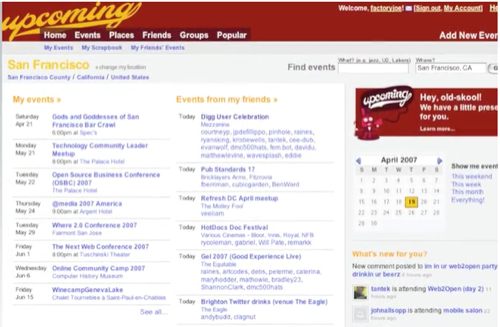
Way before Facebook events became a standard for managing social gatherings, there was Upcoming.org. Launched in 2003, Upcoming was a way for you to track events you planned to attend, invite your friends, and see the events they were going to.
Upcoming was one of the first sites that used the concept of social networking to go beyond pages and profiles, and it focused primarily on art and technology events around the world. The founders sold it to Yahoo in 2005, and like many companies so acquired, Upcoming got shut down last year, following years in which its service had merely slumped along.
Yahoo, however, recently offered to sell Upcoming.org back to its original founder, and now it’s ready to make a comeback—this time, promising not to make the mistake of selling a company users love.
And it’s using new social technologies that weren’t available the first time around.
A New Social Event Experience
Andy Baio, founder of Upcoming, launched a Kickstarter campaign on Wednesday to bring back the social events manager. The campaign achieved its goal of $30,000 in just 90 minutes. Baio is the former CTO of Kickstarter, so it makes sense for him to launch his new venture on the crowdfunding platform.
His campaign is half nostalgia, half promises of a new and better Upcoming—one that leverages our social networks to find events that our friends and contacts are excited about. Anyone who remembers Upcoming as a place to find and connect with friends can appreciate the homage to its historical mission; new users may just be interested in a social events manager that doesn’t rely on Facebook.

Upcoming will use APIs provided by Twitter and Foursquare for authentication, network graph, and place name database. In order to follow and share events with friends, people will have to use Twitter to login to Upcoming.
“I’m probably going to focus on Twitter to start. The relationships on Twitter are more conducive to the community that works on Upcoming, rather than Facebook,” Baio said in an interview. “When you follow people [on Twitter] it’s more about shared interests than it is about that you knew them once in your life.”
When Upcoming first launched, there was no way to pull in a place database—people had to add their own locations, including states, cities and venues. Now with Foursquare’s massive collection of places, users won’t have to add a new place each time an event is created.
Facebook is currently the most popular way for people to create events and invite friends, but its system is flawed. Not everyone has a Facebook account, and as social networking becomes more fragmented, friends don’t just live in one place—for instance, there are a handful of Twitter friends I’d want to invite for drinks, but they’re not my friends on Facebook. Facebook events are limited to your Facebook friends, and it’s not a great way to find and meet new people.
Eventbrite, another massive events website, also has shortcomings. While it’s great for organizing large, official meet-ups, it doesn’t create much of a community. It’s also less-than-ideal for small, personal events.
Putting People Over Data
Upcoming, if successful, could offer a serious alternative to Facebook events. But it won’t be like Facebook. Baio said he won’t collect data like photos, events and personal information and sell it to advertisers.
“I’m extraordinarily sensitive to ads and traditional ads—it’s just not something I’ve ever had any interest in and I feel like you should own your own data,” he said. “You’re putting stuff in, it’s not just data at that point. In the case of Upcoming, people were putting in their memories.”
Baio said while he might consider using email as a login option for those who would prefer to remain anonymous, the social graph that Twitter provides would give users a better way to find and follow events from people with whom they share similar interests.
Now that the new Upcoming is fully funded, Baio will get to work. There’s no precise launch date yet, but he hopes to have a public beta available by March 2015.
Images courtesy Upcoming Kickstarter










